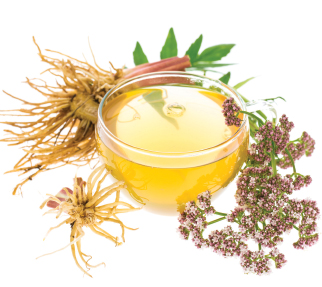
Eugenie Spiguel, MSN, ANP-BC

Jyothirmai Gubili, MS
The ASCO Post’s Integrative Oncology series is intended to facilitate the availability of evidence-based information on integrative and complementary therapies sometimes used by patients with cancer. Eugenie Spiguel, MSN, ANP-BC, and Jyothirmai Gubili, MS, explore the use of valerian for relieving anxiety and improving sleep in patients with cancer.
GUEST EDITOR

Jun J. Mao, MD, MSCE
Integrative Oncology is guest edited by Jun J. Mao, MD, MSCE, Laurance S. Rockefeller Chair in Integrative Medicine and Chief, Integrative Medicine Service, Memorial Sloan Kettering Cancer Center, New York.
Scientific Name: Valeriana officinalis, Valeriana radix
Common Names: Garden valerian, Indian valerian, Pacific valerian, and garden heliotrope
Overview
Valerian is a perennial flowering plant commonly found in Europe, Asia, and North America. Its medicinal history dates back many centuries, and it was first described by Hippocrates as a remedy for insomnia.
Valerian continues to be employed in modern times to treat nervousness, headaches, and sleeplessness. It is also used to address epilepsy, gastrointestinal spasms, and attention deficit hyperactivity disorder.
Valerian is popular in many parts of the world—in supplemental form, as an anxiety reliever, and as a sleep aid. Its powdered root is marketed as a dietary supplement in the form of capsules, tablets, and teas; the fluid extracts and tinctures are sold in both alcohol and alcohol-free bases.
The Science
Valerian demonstrated antioxidant,1 neuroprotective,2 antispasmodic,3 anxiolytic,4 anticancer,5,6 and antidepressant7 effects in preclinical studies. The potential of valerian as a sleep aid has been explored in a few studies.
In a randomized trial involving 100 postmenopausal women, 530 mg of valerian extract (taken twice a day for 4 weeks) was reported to improve the quality of sleep, compared with placebo (P < .001).8 But in a study of 119 patients undergoing active treatment for cancer, valerian (450 mg) taken orally at bedtime for 8 weeks did not improve sleep compared with placebo, as measured by Pittsburgh Sleep Quality Index scores. Researchers, however, reported improvements in secondary outcomes, which included fatigue.9

In a systematic review of 16 studies (1,093 patients), just 6 reported a statistically significant benefit in improving sleep quality with valerian, whereas the remaining trials had methodologic issues and differed considerably in dosage and treatment durations.10 Also, a meta-analysis involving 18 trials concluded that valerian may help affect subjective improvements in insomnia alone, highlighting the need for rigorous trials.11
Additional studies have reported that valerian may help mitigate vasomotor symptoms such as hot flashes in menopausal women and in treating symptoms associated with dysmenorrhea.12,13 Preliminary findings have suggested the utility of valerian products in facilitating benzodiazepine withdrawal.14 Interestingly, even though small studies suggest the positive effects of valerian against anxiety, definitive data are lacking. Literature reviews also cite insufficient evidence to draw any conclusions,15,16 so further research is needed.
OF NOTE
Physicians should be aware of the popularity of valerian as an anxiolytic; of the adverse effects and drug interactions associated with its use; as well as of the lack of long-term safety data.
Mechanistic studies indicate that constituents in valerian bind to neurotransmitter receptors that are implicated in circadian rhythms and anxiety.17 Experiments conducted with murine models have demonstrated that the anxiolytic activity of valerian is primarily due to valerenic acid, with enhanced activity due to its interaction with gamma aminobutyric acid (GABA).18 Compounds including sesquiterpenes and valepotriates were shown to have antidepressant effects as well,7,19 evidenced by elevated norepinephrine and dopamine levels in rodents treated with a valepotriate-rich extract.19 Valerian also demonstrated antispasmodic and hypotensive effects via potassium channel activation, which may be useful for patients with gastrointestinal and cardiovascular disorders.3
Adverse Reactions
Adverse reactions associated with valerian include headache, diarrhea, and other gastrointestinal complaints, daytime sedation/dullness, impaired alertness, depression, irritability, dizziness, sweating, heart palpitations, bitter taste, and benzodiazepine-like withdrawal symptoms with supplement cessation.1,9,20
Hepatotoxicity has been reported after using valerian products, with symptom resolution following cessation.21,22
Valerian was identified as a potential contributor to cases of idiopathic acute pancreatitis.23
Valerian administration to pregnant mice resulted in significant reduction in zinc levels in the fetal brain.24
Patients and their care teams need to be aware that valerian may potentially interact with some drugs via CYP450 substrates.— Eugenie Spiguel, MSN, ANP-BC, and Jyothirmai Gubili, MS
Tweet this quote
Herb-Drug Interactions
Barbiturates: Valerian was reported to prolong pentobarbital-induced sleep.25
Benzodiazepines: Valerian may have synergistic effects.26
Haloperidol: Valerian may have additive effects resulting in hepatic damage.27
Cytochrome P450 (CYP450) substrates: Valerian inhibits CYP2D628 and CYP3A429,30 and may affect the serum concentration of drugs metabolized by these enzymes.
P-glycoprotein (P-gp) substrates: Valerian inhibits P-gp transporters and may elevate the intracellular concentration of substrate drugs.30
Uridine 5′-diphosphoglucuronosyltransferase (UGT) substrates: Valerian modulates UGT enzymes in vitro and may enhance the side effects of drugs metabolized by them.31
Summary
Valerian is a popular supplement used as an anxiolytic and as a sleep aid. There is limited evidence of its effectiveness for sleep disturbance and anxiety. Patients and their care teams need to be aware that valerian may potentially interact with some drugs via CYP450 substrates. Also, abrupt cessation of its use may result in benzodiazepine-like withdrawal symptoms. Further research on valerian is needed. ■
Ms. Spiguel is a nurse practitioner with the Integrative Medicine Service, Memorial Sloan Kettering Cancer Center, New York. Ms. Gubili is Editor, Integrative Medicine Service, Memorial Sloan Kettering Cancer Center, New York.
DISCLOSURE: Ms. Spiguel and Ms. Gubili reported no conflicts of interest.
REFERENCES
1. Sudati JH, Fachinetto R, Pereira RP, et al: In vitro antioxidant activity of Valeriana officinalis against different neurotoxic agents. Neurochem Res 34:1372-1379, 2009.
2. Xu J, Guo Y, Xie C, et al: Isolation and neuroprotective activities of acylated iridoids from Valeriana jatamansi. Chem Biodivers 9:1382-1388, 2012.
3. Gilani AH, Khan AU, Jabeen Q, et al: Antispasmodic and blood pressure lowering effects of Valeriana wallichii are mediated through K+ channel activation. J Ethnopharmacol 100:347-352, 2005.
4. Murphy K, Kubin ZJ, Shepherd JN, et al: Valeriana officinalis root extracts have potent anxiolytic effects in laboratory rats. Phytomedicine 17:674-678, 2010.
5. Li X, Chen T, Lin S, et al: Valeriana jatamansi constituent IVHD-valtrate as a novel therapeutic agent to human ovarian cancer: In vitro and in vivo activities and mechanisms. Curr Cancer Drug Targets 13:472-483, 2013.
6. Lin S, Zhang ZX, Chen T, et al: Characterization of chlorinated valepotriates from Valeriana jatamansi. Phytochemistry 85:185-193, 2013.
7. Liu XG, Gao PY, Wang GS, et al: In vivo antidepressant activity of sesquiterpenes from the roots of Valeriana fauriei Briq. Fitoterapia 83:599-603, 2012.
8. Taavoni S, Ekbatani N, Kashaniyan M, et al: Effect of valerian on sleep quality in postmenopausal women: A randomized placebo-controlled clinical trial. Menopause 18:951-955, 2011.
9. Barton DL, Atherton PJ, Bauer BA, et al: The use of Valeriana officinalis (Valerian) in improving sleep in patients who are undergoing treatment for cancer: A phase III randomized, placebo-controlled, double-blind study (NCCTG Trial, N01C5). J Support Oncol 9:24-31, 2011.
10. Diaper A, Hindmarch I: A double-blind, placebo-controlled investigation of the effects of two doses of a valerian preparation on the sleep, cognitive and psychomotor function of sleep-disturbed older adults. Phytother Res 18:831-836, 2004.
11. Bent S, Padula A, Moore D, et al: Valerian for sleep: A systematic review and meta-analysis. Am J Med 119:1005-1012, 2006.
12. Mirabi P, Mojab F: The effects of valerian root on hot flashes in menopausal women. Iran J Pharm Res 12:217-222, 2013.
13. Mirabi P, Dolatian M, Mojab F, et al: Effects of valerian on the severity and systemic manifestations of dysmenorrhea. Int J Gynaecol Obstet 115:285-288, 2011.
14. Lopez-Peig C, Mundet X, Casabella B, et al: Analysis of benzodiazepine withdrawal program managed by primary care nurses in Spain. BMC Res Notes 5:684, 2012.
15. Sarris J, McIntyre E, Camfield DA: Plant-based medicines for anxiety disorders, part 2: A review of clinical studies with supporting preclinical evidence. CNS Drugs 27:301-319, 2013.
16. Miyasaka LS, Atallah AN, Soares BG: Valerian for anxiety disorders. Cochrane Database Syst Rev (4):CD004515, 2006.
17. Kennedy DO, Wightman EL: Herbal extracts and phytochemicals: Plant secondary metabolites and the enhancement of human brain function. Adv Nutr 2:32-50, 2011.
18. Felgentreff F, Becker A, Meier B, et al: Valerian extract characterized by high valerenic acid and low acetoxy valerenic acid contents demonstrates anxiolytic activity. Phytomedicine 19:1216-1222, 2012.
19. Sah SP, Mathela CS, Chopra K: Antidepressant effect of Valeriana wallichii patchouli alcohol chemotype in mice: Behavioural and biochemical evidence. J Ethnopharmacol 135:197-200, 2011.
20. Taibi DM, Landis CA, Petry H, et al: A systematic review of valerian as a sleep aid: Safe but not effective. Sleep Med Rev 11:209-230, 2007.
21. Cohen DL, Del Toro Y: A case of valerian-associated hepatotoxicity. J Clin Gastroenterol 42:961-962, 2008.
22. Vassiliadis T, Anagnostis P, Patsiaoura K, et al: Valeriana hepatotoxicity. Sleep Med 10:935, 2009.
23. Douros A, Bronder E, Andersohn F, et al: Drug-induced acute pancreatitis: Results from the hospital-based Berlin case-control surveillance study of 102 cases. Aliment Pharmacol Ther 38:825-834, 2013.
24. Mahmoudian A, Rajaei Z, Haghir H, et al: Effects of valerian consumption during pregnancy on cortical volume and the levels of zinc and copper in the brain tissue of mouse fetus. Zhong Xi Yi Jie He Xue Bao 10:424-429, 2012.
25. Komori T, Matsumoto T, Motomura E, et al: The sleep-enhancing effect of valerian inhalation and sleep-shortening effect of lemon inhalation. Chem Senses 31:731-737, 2006.
26. Bhatt C, Kanaki N, Nayak R, et al: Synergistic potentiation of anti-anxiety activity of valerian and alprazolam by liquorice. Indian J Pharmacol 45:202-203, 2013.
27. Dalla Corte CL, Fachinetto R, Colle D, et al: Potentially adverse interactions between haloperidol and valerian. Food Chem Toxicol 46:2369-2375, 2008.
28. Hellum BH, Nilsen OG: The in vitro inhibitory potential of trade herbal products on human CYP2D6-mediated metabolism and the influence of ethanol. Basic Clin Pharmacol Toxicol 101:350-358, 2007.
29. Mooiman KD, Maas-Bakker RF, Hendrikx JJ, et al: The effect of complementary and alternative medicines on CYP3A4-mediated metabolism of three different substrates: 7-benzyloxy-4-trifluoromethyl-coumarin, midazolam and docetaxel. J Pharm Pharmacol 66:865-874, 2014.
30. Hellum BH, Nilsen OG: In vitro inhibition of CYP3A4 metabolism and P-glycoprotein-mediated transport by trade herbal products. Basic Clin Pharmacol Toxicol 102:466-475, 2008.
31. Mohamed ME, Frye RF: Effects of herbal supplements on drug glucuronidation: Review of clinical, animal, and in vitro studies. Planta Med 77:311-321, 2011.

